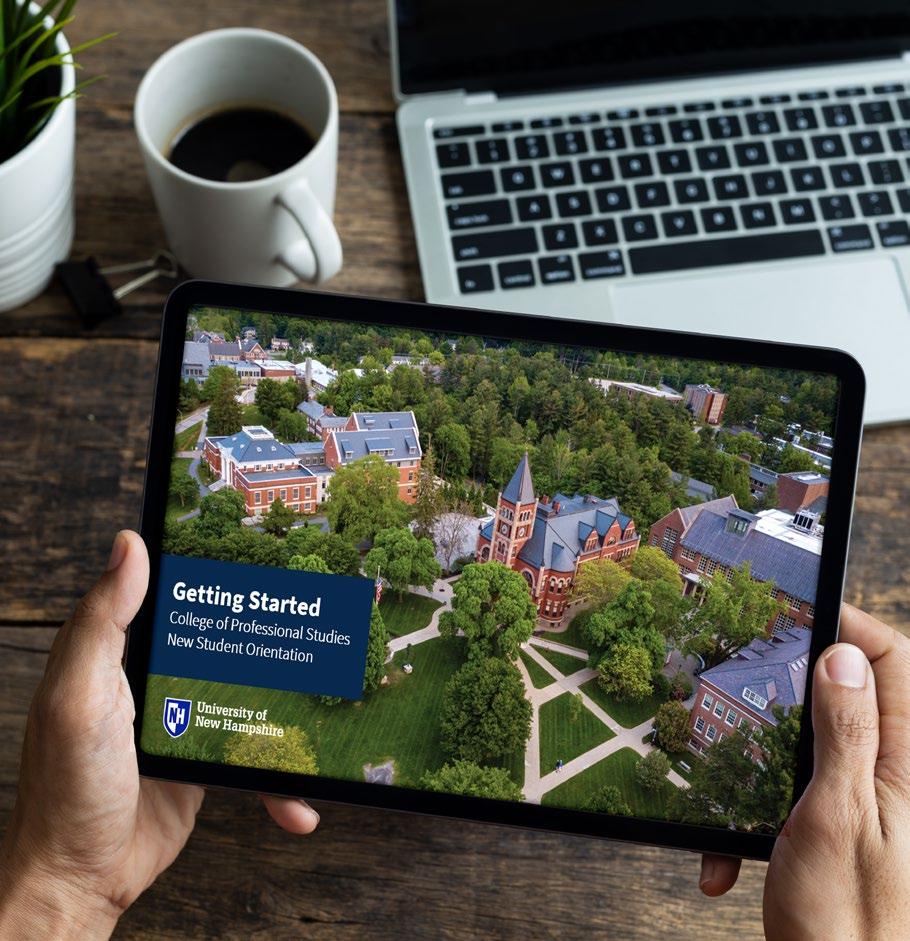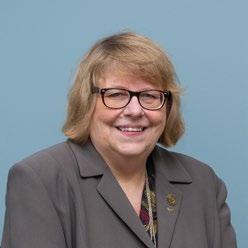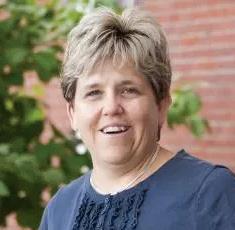
Information Technology
Exploring the Digital World
Homegrown Billy's Journey to Nonprofit Leadership Faculty Profile: Erin Holt, Marketing Faculty



Information Technology
Exploring the Digital World
Homegrown Billy's Journey to Nonprofit Leadership Faculty Profile: Erin Holt, Marketing Faculty

Habitat for Humanity is a global housing nonprofit that helped 13.4 million people create a place to call home in 2023. Habitat works in all 50 U.S. states and in more than 70 countries. It is remarkable to consider that Habitat for Humanity grew from the ambitions of three visionaries on a community farm in Georgia almost 50 years ago. Their goal was to help people achieve stability through safe, decent, and affordable housing. The mission continues today.
A shortage of affordable housing has societal impacts and is especially challenging for low-income Americans. In Central Texas, the lack of housing has caused workforce shortages and an increase in homelessness. That’s where you’ll find a transplant from New Hampshire, Billy Whipple ’12 ‘23G, in Austin, Texas, where he has been focused on the Habitat for Humanity mission for over 14 years.
Billy’s journey to Texas and an impactful leadership career had its start in New Hampshire.
I began my career as a weekend/summer construction laborer for the company my dad worked for. I would clean up job sites, dig holes, and deliver material. After I graduated from Dover High (NH), I joined their company full-time and began an apprenticeship. This is where I fell in love with building.
Billy was excited by the “art and science” of construction. He was eager to grow in the field. Opportunity was plentiful as U.S. homeownership was booming. However, in 2006,
home prices started to drop, mortgage-backed securities were sold off, and foreclosures rose to record levels. By the winter of 2008, the U.S. economy was in recession, taking the housing market down with it.
I was a young, ambitious builder with nothing to build. This is when I looked for options to continue building. Following in my older brother’s footsteps, I discovered AmeriCorps and began working with Habitat for Humanity.
AmeriCorps is the federal agency for national service and volunteerism. In partnership with Habitat organizations, AmeriCorps members serve in diverse roles to build and repair homes, expand housing services, and engage the community. During their time with Habitat, AmeriCorps members make significant contributions while learning and developing lifelong skills and confidence.

As an AmeriCorps member, I served alongside staff and volunteers at our Austin Habitat construction and home repair sites. I felt like I was starting again, cleaning sites, digging holes, and delivering material. What I didn’t realize was how much I would need to develop as a leader, and that was the place to do it.
In time, as part of his professional growth, Billy recognized the importance of building upon his practical experience with advanced knowledge of organizational behavior, leading teams, and strategic planning.
Individuals join nonprofits because of their passion and motivation towards the mission. As a leader in the nonprofit sector, I feel privileged to be able to make a positive difference in my community. The decisions I make impact the lives of our clients, how volunteers interact with their neighbors, and the future of our employees. It's an intense and humbling role that I take very seriously.
Billy also strongly believes that “leaders are always learning,” so he returned to his alma mater a decade later for a master’s degree in leadership. He learned that UNH was a School of National Service, providing benefits to AmeriCorps and City Year members and alumni.
AmeriCorps and the college each had a huge impact on my life and career. When I returned for graduate school a decade later, seeing how UNH valued AmeriCorps alumni was very inspiring. The partnership is helpful because I know that my service is acknowledged and appreciated by the school, and this gives me a lot of pride in both.
Billy faced challenges balancing his time and setting priorities between work, school, service, and family. Still, he is abundantly grateful for all those who supported him, especially his wife, Cassidy. Looking back, Billy also credits his mother as a role model for returning to school as an adult learner.

I found my mom’s determination to pursue education while working multiple jobs to be really inspiring. Her example taught me that education is attainable and important at any stage of your life.
One aspect of the leadership program that Billy truly appreciated was the ability to put the lessons learned from class assignments and research into practice. Leading Teams (LD804) was an especially impactful course.

My team would tease me about testing theories out on them, and they were right! Together, we tried new approaches and implemented proven strategies. I could see the benefits of my coursework immediately.
Today, Billy serves as the Chief Impact Officer for Austin Habitat for Humanity. His life has come full circle as he encourages and inspires those with “more aspiration than construction experience” to grow personally and professionally in fulfillment of Habitat’s important mission.
I moved here from New Hampshire in 2009 to join AmeriCorps. What I thought would be an 11-month stint has turned into my home. I have worked on the construction, volunteer engagement, client services, and senior leadership teams. I truly enjoy setting a vision, clearing a path, and setting my team members up for success. But what I love most is that I still get to build.

Erin Holt earned a master's in professional communications from Clark University and holds undergraduate degrees in marketing and communications and child psychology. Erin has worked in the marketing and communications field for more than 18 years for private and nonprofit organizations throughout New Hampshire. She is currently the director of marketing and communications for Northeast Delta Dental. She leads the strategic planning and implementation of the company's marketing and communication efforts and corporate giving. Erin also has extensive experience with public relations, industry research, website content optimization, SEO and website accessibility.
What attracted you to pursue a career in marketing? What do you love most about the field?
Marketing was not my first choice in career, but after not getting into some of the courses I wanted in college, I took a couple of marketing courses. I had one professor who made the field exciting and encouraged me to continue looking into the field. I fell in love with the creativity needed and the way it intersected with data and analytics.
What prompted you to start teaching?
My experiences in graduate school made me consider teaching. There was a mix of traditional students and adult learners, and many of my professors were professionals in the field and chose to teach as well. This combination created an amazing classroom experience. I learned so much from the experiences of my professors and classmates, most importantly, the real-life application of the topics we were discussing in the classroom. It was exciting to think I could bring some of those same learning experiences to others.
What do you enjoy most about teaching adult students?
I have always been impressed by the dedication it takes for adult students to pursue education while balancing their everyday life and career. I think this plays a huge role in their engagement in the course and interest in the topics and material being covered in the course. They bring a different energy to a classroom. They ask challenging questions, have an interest in the ‘why’ behind things and use their life experience as a tool in their coursework. All things I thoroughly
appreciate. One of my favorite parts of every course is the discussion boards.
Why is communication such an important element of effective marketing?
Communication is at the core of marketing and so many other parts of life. Without communication, more importantly, effective communication, an organization will never be successful in conveying its brand or core values, and without these, there is no connection to consumers. Clear and effective communication sets an organization apart from a competitor, fosters beneficial relationships with customers, and establishes an organizational identity.
What advice do you have for someone who wants to pursue a career in marketing?
I think it comes down to something that I often heard as a child, “Learn something new every day.” It may sound simple, but it truly is important in a field that changes so quickly. The field of marketing is evolving at an unbelievable rate, with advances in technology being one of the major drivers. If you approach the field with an open mind, always looking for new ways of doing things and being creative, success will follow. I wake up every day with the intent to learn something new about the field: a new use of technology, a new way an organization is doing something, a major success or failure of a marketing campaign – anything new or different. Some of the biggest successes in marketing are when someone tries something new. And it helps to love data and statistics just as much as being creative!
The anticipation of starting or returning to college is exciting! Of course, it also comes with many questions. Whether you seek career guidance, registration support, financial aid, or academic advising, our team will be available by chat, phone, via Zoom, or email.
Chat Live | Submit a Question
Inquire & Get Connected
Our academic calendar contains important dates related to course registration, financial aid, tuition payment, as well as various academic or college-wide deadlines.
• April 15 (Mon.)
Registration begins for graduate and PBTC studentsRegister online or by phone
• April 22 (Mon.)
Registration begins for undergraduate and nondegree seeking students.- Register online or by phone
• July 26 (Fri.)
Deadline to submit a request for a course not on the schedule
• August 1 (Thu.)
SAP appeal deadline for term reentry
• August 2 (Fri.)
Preferred Financial Aid submission date for Fall Terms 1 and 2
• August 14 (Wed.)
Tuition and fees payments due no later than 5:00 p.m. (ET) for all courses beginning the week of August 26, 2024. This includes payment arrangements, such as financial aid. Immediate payment is required in order to register for courses after this deadline.
• August 26-30 (Mon.-Fri.)
First week of Fall full semester
• August 30 (Fri.)
Last day to add Fall Term 1 courses
• September 6 (Fri.)
Last day to add full semester courses
• September 6 (Fri.)
Last day to drop Fall Term 1 courses
• September 20 (Fri.)
Last day to withdraw from Fall Term 1 courses
• October 14-18 (Mon.-Fri.)
Last week of Fall Term 1 courses
• October 16 (Wed.)
Tuition and fees payments due no later than 5:00 p.m. (ET) for all courses beginning the week of October 28, 2024. This includes payment arrangements, such as financial aid. Immediate payment is required in order to register for courses after this deadline.
• October 25 (Fri.)
Last day to withdraw from full semester course with a W on the transcript.
• October 28 - November 1 (Mon.-Fri.)
First week of Fall Term 2 courses
• November 1 (Fri.)
Last day to add Fall Term 2 courses
• November 8 (Fri.)
Last day to drop Fall Term 2 courses
• November 22 (Fri.)
Last day to withdraw from Fall Term 2 courses
• December 9 (Mon.)
Last day of class for full semester courses
• December 16-20 (Mon.-Fri.)
Last week of Fall Term 2 courses
Focused exclusively on adult students, we have been consistently recognized for our long-term investment in designing and scaling student services, technologies, curricula, and instructor training to support student success. We are top ranked in New Hampshire for "Best Online Bachelor's Programs" and nationally recognized as "Military Friendly®" and among the "Best Online Bachelor's for Veterans" by U.S. News and World Report.
Learn More About All UNH Degree Programs: catalog.unh.edu/programs
Associate
• A.S. Behavioral Science (7 Options)
• A.S. Business (10 Options)
• A.S. Communication Sciences and Disorders
• A.A. General Studies
• A.S. Early Childhood Education
Bachelor’s
• B.S. Accounting and Finance
• B.S. Applied Psychology (9 Options)
• B.S. Business Management (16 Options)
• B.S. Computer Information Technology (3 Options)
• B.S. Early Childhood Education
• B.S. Criminal Justice
• B.S. Digital Communication Design (2 Options)
• B.S. Health and Wellness
• B.S. Health Care Management
• B.A. Historical Studies
• B.S. Human Resource Management
• B.S. Human Services (7 Options)
• B.A. Individualized Studies (1 Option)
• B.S. Individualized Studies (6 Options)
• B.S. Marketing
• B.S. Operations, Supply Chain, and Logistics Management
• B.S. Professional Communication (3 Options)
• B.S. Public Administration
• B.S. Technology Management
Bachelor’s
These options require an earned associate degree in a related field, maximizing your transfer credits toward a bachelor’s degree.
• B.S. Allied Health Leadership
• B.S. Applied Studies Education and Training
• B.S. Applied Studies Management
• B.S. Fire Service Administration
• Nursing (RN to BSN)
Note: Professional licensure, certification, or training may serve as a foundation to these degrees, upon approval by Academic Affairs.
• Accounting
• Addictions Studies
• Adult Learning and Development
• Applied Psychology
• Business and Strategic Communication
• Computer Information Technology
• Counseling Foundations
• Court Advocacy
• Criminal Justice
• Data Analytics
• Digital Marketing
• Early Childhood Education
• Economic Sciences
• Education Advocacy
• Emergency Management Strategy and Planning
• Entrepreneurship and Innovation
• Family Studies
• Finance
• Global Business
• Graphic Design
• Health Care Management
• Historical Studies
• Hotel, Restaurant, and Travel
• Human Resource Management
• Human Services
• Interpersonal and Organizational Communication
• Leadership, Change, and Social Responsibility
• Management
• Nonprofit Management
• Operations, Supply Chain, and Logistics Management
• Organization and Business Administration
• Organizational Psychology
• Professional Sales
• Public Administration and Policy
• Visual Communication and Social Media
• Wellness and Prevention
• Writing for Visual Media
• M.S. Health Care Management
• M.S. Human Services Administration
• M.S. Instruction and Leadership
(Requires Post-Baccalaureate Teacher Certification with a minimum of 24 earned credits)
• M.S. Leadership
• M.S. Project Management
• MSN Health Care Leadership
Learn More on Page 16
These programs allow you to specialize your knowledge through a shorter, focused sequence of courses. The credits earned in our certificate programs can also be applied toward their corresponding master’s programs, allowing you to earn a certificate on the way to a degree.
• Health Care Management
• Human Services Administration
• Nonprofit Leadership
• Operations Management
• Project Management
For a complete listing of all UNH online graduate programs, including M.S. Cybersecurity Policy and Risk Management, M.S. National Security Intelligence Analysis, and Data Science Certificate, visit online.unh.edu/academics
We offer four NH Department of Education-approved bachelor’s degrees with a selection of teacher certification options.
Options:
B.S. in English Language Arts
Certification options include:
• Early Childhood Education and Early Childhood Special Education
• Elementary Education and General Special Education
• General Special Education
B.S. in Math Studies
Certification options include:
• Elementary Education and General Special Education
• General Special Education
• Mathematics, Middle Level
• Mathematics, Middle Level and General Special Education
• Mathematics, Upper Level
B.S. in Social Studies
Certification options include:
• Elementary Education and General Special Education
• General Special Education
B.S. in Early Childhood Education
Certification options include:
• Early Childhood Education and Early Childhood Special Education
For those with a bachelor’s degree seeking initial or an additional certification.
• General Special Education
• General Special Education and Elementary Education
• Early Childhood Education and Early Childhood Special Education
• Life Sciences, Upper Level
• Mathematics, Middle Level
• Mathematics, Upper Level
• Elementary Education
• General Special Education
• Early Childhood Education and Early Childhood Special Education
• Life Sciences, Upper Level
• Mathematics, Middle Level
• Mathematics, Upper Level
• Reading and Writing Teacher*
• Reading and Writing Specialist*
• Digital Learning Specialist
Advanced Endorsements:
For certified special education teachers.
• Learning Disabilities (LD)
• Intellectual and Developmental Disabilities (IDD)
• Emotional and Behavioral Disabilities (EBD)
We are dedicated to supporting you as you complete your program. Our knowledgeable and caring advisors assist students as they transition to our learning environment. They also help students identify goals and develop strategies to achieve them.
Schedule an Advising Appointment:
Call: 1-855-472-4255 or Chat Live at: cps.unh.edu/online
The details included in the printed and digital version of this course schedule are helpful for planning and accurate as of the date of publishing. For the most up-to-date course information, visit our Course Search Database. Search for a UNH CPS course by selecting the CPS Online "campus" and entering Course Subject & Number (Ex: MGMT 611) or Title (Ex: Money and Banking).
Visit: courses.unh.edu
College Catalog
The College Catalog contains helpful information such as course descriptions, prerequisites, restrictions, and policy information.
Visit: catalog.unh.edu
Stay connected with our online student community through our social media channels and blog.
Social Media
Facebook: @uofnhonline
Instagram: @unhonline
LinkedIn: @unhonline
On the Web
Visit: cps.unh.edu/online
Current Student Resources: cps.unh.edu/current-students
Student Success Blog
Visit: cps.unh.edu/blog

Whether you’re starting college for the first time or returning to finish your degree, attending an orientation gives you a valuable introduction to UNH CPS that will help you feel prepared as a student.
There are two essential orientations:
• New Student Orientation
Overview of the resources and support available to you as a student, plus success tips for your first term.
• Canvas Orientation
Learn how to navigate and participate in your online courses in Canvas, the university's learning management system.
Orientations are available on-demand and via live webinars.
View Details & Dates: cps.unh.edu/orientation
UNH offers a full complement of services to meet student research needs. Library services are available by email, live chat, and phone. Local students may visit the UNH Manchester Library during regular hours.
Learn More: cps.unh.edu/library
| cps.unh.edu/online
| cps.unh.edu/online The following listing displays in-state tuition cost. A full breakdown of tuition and fees is available on page 23. Courses each
Online Asynchronous
The course and all direct instruction is 100% online. These courses include no requirements for face-to-face contact, on-site instruction, or for the student to be online at specified times (except proctored exams when applicable).
The course is online. There is no requirement for face-to-face contact, or on-site instruction. All class activity is completed online and organized around scheduled class meeting days/ times.
As you near the 90-credit mark on the road to complete your bachelor’s degree, you may already be thinking about a master’s. Accelerated graduate programs allow students pursuing specific degree programs to complete their bachelor’s and graduate degrees together, saving time and money!
Health Care Management
• Master's Degree or Graduate Certificate Option
• Student must be currently enrolled in: B.S. Allied Health Leadership or B.S. Health Care Management
Human Services Administration
• Master's Degree or Graduate Certificate Option
• Student must be currently enrolled in: B.S. Human Services Leadership
• Master's Degree
• Student must be currently enrolled in: B.S. Applied Studies Management, B.S Public Administration, B.S. Business Management: Leadership, Change and Social Responsibility Option or Nonprofit Management Option

If you want to enroll in an accelerated graduate program, contact your advisor for more information and full eligibility requirements.
The following listing displays in-state tuition cost. A full breakdown of tuition and fees is available on page 23. Courses each term are subject to change from the time of printed publication. For the most up-to-date course information, visit: courses.unh.edu
Note: Registration hold - advisor approval required | Online Synchronous: Virtual meetings on Tuesdays 8/27, 9/10, 9/24, 10/8, 10/22, 11/5, 11/19, from 6:10 PM to 7:30 PM | Capstone Virtual Event Days: 12/4 & 12/5
Note: Registration hold - advisor approval required | Online Synchronous: Virtual meetings on Thursdays 8/29, 9/19, from 5:40 PM to 6:30 PM

Available fully online, our graduate certificate is a four-course, 12-credit program that will help you gain essential skills quickly. The credits earned in our certificate program may also be applied toward the master’s program, allowing you complete a certificate on the way to a degree!

Nearly every job posting includes the words “must have strong communication skills.” At its most basic level, good communication reduces misunderstanding and increases clarity, which helps enable productive and collegial relationships in the workplace and connections in our daily lives.
Below, senior lecturers Dr. Rita Kondrath, Dr. Karen White, Dr. Sunil Ramlall, and Dr. Kathy DesRoches share key reasons for developing effective communication skills to strengthen personal effectiveness regardless of your discipline.

“Engaging top talent is a priority in today’s competitive environment. Your ability to communicate details about your company in a clear and logical way that recognizes different learning styles makes a positive difference in candidates’ assessment of the opportunity. An effective communication strategy during the recruitment stage supports candidate confidence and enthusiasm.”
– Dr. Sunil Ramlall

“Remote work is common in businesses and provides many benefits for both employer and employee. However, it is easy for remote workers to feel disconnected when managers do not employ regular, creative communication strategies that demonstrate value for individual employees’ contributions as well as their unique multidimensional selves outside of work.” – Dr. Rita Kondrath

“In project management, ‘pull communication’ provides mechanisms for the project team, managers, and other stakeholders to access information as needed. Whether through a website, knowledge base, CRM system, or project folder, the emphasis is on organization and ease of access to essential information. Project managers who are skilled in communicating with all project stakeholders, be it project team members or external customers, support information transparency and project success.” – Dr. Karen White

“We often associate business communication with external audiences. However, communication within your team, especially during times of change, has an important purpose. Effective communication demonstrates respect by keeping everyone on the same page and by reinforcing goals, addressing areas for improvement, and strengthening commitment to the organization.” – Dr. Kathy DesRoches
The following listing displays in-state tuition cost. A full breakdown of tuition and fees is available on page 23. Courses each term are subject to change from the time of printed publication. For the most up-to-date course information, visit: courses.unh.edu
The following courses are open to students admitted to the Post-Baccalaureate Teacher Certification Program or by permission of the School of Education. Additionally, these courses are open to other qualified individuals who wish to take one or more courses on a continuing professional development basis. For more information, contact the School of Education at 603-822-5431.

1. Review your degree planning tools through DegreeWorks to determine unmet requirements. Access your degree audit through WebCat.
2. For each course you wish to take, check prerequisites to ensure you have completed all of them. Please note that some undergraduate courses require a pre-registration skills assessment.
3. Contact your academic advisor with any questions.
To Register for Courses, Visit Us Online or Call: cps.unh.edu/register | 1-855-472-4255
UNH reserves the right to cancel, postpone, or combine class sections, limit registrations, or change instructors. We regret any errors in printing, but we accept no liability for them. Please refer to WebCat for the most updated course schedule.
Students may register for 8-week courses during the official Add Period, which is one week after the course start date.
Students may drop courses during the official Drop Period, which is two weeks after the course start date.
Contact your advisor or the Registrar’s Office for assistance. For courses that do not follow the 8-week schedule, Add Period and Drop Period dates are posted on cps.unh.edu/add-drop.
(See page 1 for payment schedule)
If a third party (such as an employer or outside agency) has agreed to pay all or part of your course charges, you must provide a written billing authorization to the Student Accounts Office. The billing authorization must be on official letterhead and include the billable amount. No extensions or deferments will be granted if you will be reimbursed for courses after the completion of a term. Payment must be made directly to UNH upon receipt of an invoice. Payment not contingent upon grade. Cash will not be accepted.
Contact the Student Accounts: 603-513-1330 | 855-472-4255 option #4 studentaccounts.cps@unh.edu
When enrollment is available, Payment Plan links will appear on the Account View page in Webcat. The payment plan carries an enrollment fee of $60 for each semester you enroll in the plan.
(Updated 5/6/24)
Course charges, fees, and regulations are subject to approval by the University System Board of Trustees and can change without prior notice.
For Tuition Updates, Check: cps.unh.edu/tuition
Undergraduate and Post-Baccalaureate Costs:
• $314 per credit hour in-state ($379 out-of-state)
• $314 per credit hour for learning agreements
Graduate Costs:
• $570 per credit hour in-state ($640 out-of-state)
Fees:
• Registration Fee: $47
• Academic Services Fee: $47
• Field-Based Mentoring Fee: $275 *
• Prior Learning Assessment Fee: $350
Some courses have materials or other fees (see individual course listings).
*Field-based courses that require the oversight of a Field-Based Mentor will have an additional fee assessed.
Students are responsible for purchasing textbooks and materials. Textbooks are an additional expense. Find detailed information about required books, including ISBN, online.
Visit: unh.bncollege.com
1. Click on tab, "Course Materials & Textbooks"
2. Select "Find Course Materials"
3. Choose Campus: "University of New Hampshire – CPS Online"
4. Fill in your course information
5. Click: "Retrieve Materials" button
Federal, State, and/or Institutional Financial Aid is available to all qualifying degree seeking students, as well as eligible postbaccalaureate and graduate students, to assist with the cost of their education. Students must complete the Free Application for Federal Student Aid (FAFSA), be admitted to an eligible program, and be attending at least half-time (undergraduate and postbaccalaureate students: 6 credits/semester; graduate students: 5 credits/semester) in order to receive aid.
Contact the Office of Financial Aid at: 603-513-1392 | 855-472-4255 option #3 | financialaid.cps@unh.edu
Learn More, Visit: cps.unh.edu/tuition-aid
1-855-472-4255 | cps.unh.edu/online
The University of New Hampshire College of Professional Studies is top-ranked in New Hampshire by U.S. News & World Report for "Best Online Bachelor's Programs" and "Best Online Bachelor's for Veterans." We're proud to share that we've once again earned the designation as a 2024-2025 Military Friendly™ School.
Our commitment to being Military-Friendly™ is more than a catch phrase. More than 60% of our financial aid budget is devoted to supporting military students and we offer a wide range of resources and benefits.
We award the maximum credit for your military training based on American Council on Education (ACE) recommendations and guarantee at least 64 credits to transfer from CCAF. We also offer other options that let you demonstrate college-level learning, such as workplace training and equivalency tests (DANTES, CLEP).
We cap our undergraduate tuition rate at $250/credit so it matches the DoD Tuition Assistance (TA) Program. Graduate students receive a 15% discount on their cost per credit.
We are partners with the CCAF’s GEM and AU-ABC programs to help enlisted Airmen fulfill general education requirements online and transition to a bachelor’s degree.
Maximize your military education benefits with our affordable tuition and fees. Through our Active Duty Tuition Discount and participation in the Post 9/11 Yellow Ribbon program, we’re committed to supporting those who served regardless of residency status.
We offer a 15% tuition discount to spouses of Active Duty, National Guard, and Reservist servicemembers admitted to an undergraduate or graduate degree or certificate program.




“ I not only wanted a school that had my program, but I also wanted a college that was a good fit for servicemembers. The instructors understand what we go through and make sure that we can be successful in class. ”
— Mia Tran ‘22

The UNH CPS library in Manchester provides ample resources for our students' research projects and other coursework. Our team of librarians not only ensures the library runs smoothly but also offers guidance to students who need assistance. We asked them about the best library resources they recommend and how they can help you with your research projects!


What new library resource are you excited about?
Lia: The New York Times online, including the ability for students, faculty, and staff to create and use personal accounts! You can access the news site, games, Cooking, Podcasts, and much more.
With so much information available, what makes the role of a librarian so important?
Cindy: CPS librarians are so important because there is so much information available. We help you to identify the good information from the bad. We teach you the skills to become independent researchers, but we are always available when you need us.
Kathleen: Librarians serve as guides, helping individuals, especially students, develop the skills and competencies needed to locate, access, and use information effectively.
What kind of undergraduate student projects do you most enjoy?
Lia: I am always impressed by how seriously our undergraduate students take their research projects. It’s one of my favorite parts of my job when I get to work with students to investigate questions that matter to them personally, in their daily lives, and in their communities.


Can you name a few resources that graduate students will find especially helpful?
Kathleen: CPS graduate students enjoy personalized support from librarians, and access to the Library Search Box for seamless exploration of articles, journals, multimedia, and more. Extended borrowing and document delivery enhance accessibility, contributing to an enriched academic experience.
Carolyn: CPS graduate students will benefit from the JSTOR database, which provides online access to scholarly books and journal articles in various academic disciplines. Psychology students will find the library’s online subscription to the DSM-5 very useful, and all students will appreciate the broad selection of documentary and feature films in the Kanopy Streaming Service.
What is the best part about being a librarian at UNH College of Professional Studies?
Cindy: The best part about being a CPS librarian is that I get to witness and play a small part in the amazing transformation our students make.
Carolyn: I enjoy assisting CPS students with their research projects and teaching them how to navigate the library’s many online resources. It’s incredibly gratifying to help students achieve their academic goals!
Access online books & articles, view research guides, or get personalized assistance.

Our world runs on technology. The tech industry makes up more than 15 percent of the global economy, and every industry and sector in society is touched by and incorporates at least some element of technology.1 More than any other country, the United States invests time, money, and energy in tech. One-third of the world’s technology market is based in the United States.2
Thanks to its expansive integration, information technology has become a booming industry with a plethora of career opportunities. The demand to fill tech positions, such as cybersecurity analysts, is projected to grow 32 percent in the next 10 years –that’s ten times the national average growth rate for all occupations.3
Beyond its vast reach and exponential growth, the tech industry's appetite for diverse skill sets creates a welcoming environment for professionals from all walks of life. While technical know-how is important, the industry equally values strategic thinking, operational experience, and project management skills. Professionals from varying fields, such as business, healthcare, law enforcement, finance, and beyond, can readily translate their existing expertise.
The tech industry is also one of the most well-compensated fields. According to Forbes, computer science is the number one college major with the highest starting salary, raking in a median base salary of $70,000 for entry-level positions.4 Information Technology (IT) follows close behind in sixth place, with a median base salary of $64,000 for entry-level positions.
SOURCES:
1. World Economic Forum. Digital Trust: How to Unleash the Trillion-Dollar Opportunity for Our Global Economy. (Visited January 2024).
2. Select USA. Software and Information Technology Industry Overview. (Visited January 2024).
3. Forbes. The 20 College Majors with the Highest Starting Salaries. (Visited January 2024).
4. U.S. Bureau of Labor Statistics. Computer and Information Technology Occupations. (Visited January 2024).

“To me, the biggest attraction of information technology is how fast it’s progressing and the sheer scope of its impact. Look at how automation has redefined manufacturing, how video conferencing has shrunk the global village, and how social media has democratized communication. Every industry and every aspect of our lives feels the ripple effects of this digital revolution.”
– Ron Danault
Online Professional Faculty and Program Director Computer Information Technology Programs

“Cybersecurity concerns and mitigation plans must be analyzed and communicated to leadership to facilitate strategic decisionmaking. Cyber risks must be anticipated and managed in alignment with an organization’s mission, business goals, and enterprise risk tolerance levels. We prepare graduates to play a critical role in ensuring organizational agility and resilience.”
– Maeve Dion
Program Director
M.S. Cybersecurity Policy & Risk Management
Software developers are responsible for building the many computer and smartphone applications that people use every day in their professional and personal lives. It’s a great career path for those who are creative and innovative.
• Average Salary: $124,200
• Job Growth Potential 2022-2032: 25%
• Related Degree: B.S. Computer Information Technology: Software Development Option
Computer system managers oversee the technological infrastructure of an organization, including its computer network and data systems. They manage a team of IT professionals responsible for everything from data storage and software updates to cybersecurity and tech strategy.
• Average Salary: $164,070
• Job Growth Potential 2021-2031: 15 percent
• Related Degree: B.S. Technology Management
Cybersecurity analysts ensure that computer networks are secure to prevent hackers from breaking in and stealing information or installing viruses. Cybercrime is constantly evolving and developing new strategies, so cybersecurity professionals need to be adaptive, intelligent, and cool under pressure.
• Average Salary: $112,000
• Job Growth Potential 2022-2032: 32 percent
• Related Degree: B.S. Computer Information Technology: Cybersecurity Option, M.S. Cybersecurity Policy and Risk Management
Data scientists use technological tools to analyze data sets and gain information from them. The insight acquired from data analysis aids in important decisionmaking processes throughout organizations. This role is a great career path for those with a background in business, finance, or any other numbers-based field.
• Average Salary: $103,050
• Job Growth Potential 2021-2031: 35 percent
• Related Degree: B.S. Computer Information Technology: Data Analytics Option, Graduate Certificate in Data Science
IT business analysts find technical solutions to solve companies’ challenges. They analyze operations and to improve efficiency by suggesting technical systems and adjustments to processes, products and services. Those with a business, management, or operations background would be well-suited for this role.
• Average Salary: $95,290
• Job Growth Potential 2021-2031: 10 percent
• Related Degree: B.S. Computer Information Technology: Entrepreneurship and Innovation

CMPL 525: Foundations of Cybersecurity
Learn the tools, technologies, and strategies to protect against cybersecurity vulnerabilities and get inside the mind of how hackers work and think.
CMPL 660: Mobile Application Development*
Learn how to design smartphone applications for both Android and IOS platforms. Build your own app from the ground up and learn about the importance of user experience (UX) and user interface (UI) layouts.
*This course has prerequisites.
• B.S. Technology Management
• B.S. Computer Information Technology Concentration Options Include:
• NEW! Cybersecurity
• Data Analytics
• Entrepreneurship and Innovation
• Software Development
Minor:
• Computer Information Technology Graduate Programs
• M.S. Cybersecurity Policy and Risk Management
• Graduate Certificate in Data Science
For a complete listing of all UNH online programs, visit: online.unh.edu/academics
Our Technology Programs: Visit: cps-info.unh.edu/technology-programs
Offering top-ranked, 100% online programs in today’s fastest-growing industries.
Among the colleges with the lowest undergraduate tuition and fees in New Hampshire and New England.

– Jamie, BSN Student " "
When I was in school before, l did it because people told me to. Now, it’s because I personally want to achieve my degree.
Students may transfer in up to 90 credits - saving time and money! Request More Information cps-info.unh.edu/ccsnh



